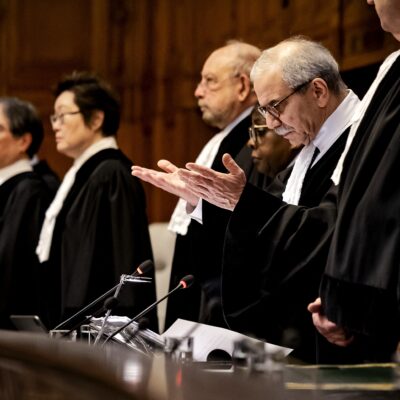Following trips to Israel, lawmakers question future of U.S. security coordination with Palestinians
Lawmakers came away divided over how, or if, the U.S. can help stabilize the security situation in the West Bank

Nasser Ishtayeh/SOPA Images/LightRocket via Getty Images
Palestinian gunmen from the Fatah movement carry their weapons in support of the Palestinian Authority headed by President Mahmoud Abbas during a military parade in the West Bank city of Nablus.
Following recent trips to Israel, some lawmakers are expressing skepticism over the future of U.S. security coordination with the Palestinian Authority’s Security Forces, and are divided over how the U.S. can help stabilize the increasingly volatile security situation in the West Bank.
The U.S. has for the past two decades played a key role in coordinating security efforts between Israeli and Palestinian security forces, and has also trained Palestinian security forces. The program has historically enjoyed bipartisan support. Multiple congressional groups visited Israel last month around the time of the Israeli counterterrorism operation in the West Bank city of Jenin, which has seen a significant rise in terrorist activity in recent years as PA security forces are believed to have dwindling control of the area.
Asked whether he sees a future for U.S. cooperation with Palestinian forces, Sen. Rick Scott (R-FL), who was in Israel during Israel’s military operation in Jenin, said that he’s “always hopeful, but [Palestinian security forces have] to do their job.”
“If [the PA] want[s] to have control over the West Bank, they’ve got to be policing, they can’t let these terrorists [operate] in there that are killing Israeli civilians,” he said. “If they’re not, Israel has no choice but to defend their security and defend their citizens.”
Rep. Doug Lamborn (R-CO), who a year ago signed onto a bipartisan letter emphasizing the importance of a U.S. security coordinator position for preserving security and stability between the Israel and the Palestinian security forces, told JI that he he does not see the PA or its security forces as a real solution to terrorism in the West Bank at this point.
“Their turning a blind eye to the effects of their policies is what’s led to a lot of the radicalization,” Lamborn said of the Palestinian Authority. “They’re basically not doing anything to stop radicalization.
Rep. Jimmy Panetta (D-CA) — who traveled with Lamborn on a national security-focused trip sponsored by the American Israel Education Foundation — said that questions over the future of security coordination came up during the delegation’s high-level meetings in Israel.
Panetta said that Israeli officials emphasized that terrorist groups have been gaining traction in the West Bank because the PA is losing “legitimacy from Palestinians” who are also frustrated both with Israel and their own economy in the West Bank.
“The message was basically, ‘We need to bolster the economy at the local level, in the West Bank, in Gaza, in order to ensure that they have their own security — their own economic and social security — so that they don’t feel this disillusionment with their own government,” Panetta said. “That was a message that resonated with me — that there needs to continue the effort of providing the necessary resources [to the Palestinians].”
Scott, on the other hand, said that the most important step the U.S. can take to address the growing destabilization in the West Bank is to offer rhetorical support for Israel and highlight the impacts of terrorism on Israelis.
“We can’t make anybody do anything,” Scott said. “All we can do is support people that are doing the right things.”
Lamborn echoed that view, explaining that his current goal is to “make sure the Biden administration doesn’t make mistakes when it’s dealing with Israel” — giving as one example the lack of an invitation to Prime Minister Benjamin Netanyahu to the White House. Last week, President Joe Biden invited Netanyahu for a meeting in the U.S., weeks after the delegation visited Israel.
The Colorado congressman, who was the lead House sponsor of the Taylor Force Act, also said that top PA officials with whom the delegation met blamed Israel for security issues in the West Bank.
“We did ask [a top PA official] about controlling terrorism. And he blames Israel for the poor condition of things,” Lamborn said. “And I also asked him about the Taylor Force Act, by the way, [and] he blames Israel on that. Whatever the issue was, he blamed Israel.”
During his meeting with the House delegation, Netanyahu announced that he would be visiting China and meeting with President Xi Jinping. But the lawmakers dismissed the notion that Netanyahu could be seeking to rebalance Israel’s relations with the U.S. and China or otherwise hedge his bets as China seeks to make inroads into the Middle East.
“He knows that America is his ally,” Scott said, arguing that the administration’s posture toward Netanyahu “creates an opening for China” which “wants to upset our relationships all over the world, including with Israel.”
Lamborn, who was part of the group to whom Netanyahu announced the China trip, said the group “urged them not to put too much stock in China.”
“The indication to us is they don’t want to rely on China. They can’t afford to ignore major powers in the world. And they realized and stressed again, multiple times, that the U.S. is the closest and strongest ally, by far, of anyone out there,” the Colorado congressman said. “But they presented it to us as they’re just trying to be prudent in trying to work with powerful forces in the world and not slight them.”
Panetta said that Netanyahu had emphasized during their meeting that any relationship with China would not supplant Israel’s relationship with the U.S.
Netanyahu “stressed that he has relationships with a number of countries and… nothing beats the relationship with the United States,” Panetta told JI. “Obviously, Israel has relationships with other countries. We firmly believe — the message was clear — that the United States is its number one partner.”
Panetta added that President Isaac Herzog’s visit to the U.S. last week underscored the dynamic between Jerusalem and Washington.
Despite tensions within the Democratic caucus over Israel that flared in the run-up to Herzog’s visit, Panetta emphasized that critics of Israel comprise a “really a small faction” of Congress. He added that the visit showed both his colleagues and the world that “an overwhelming bipartisan majority… supports a strong Israel-U.S. relationship, especially when it comes to the security of Israel.”
Rep. Jim Baird (R-IN), who also joined the House delegation, said he believes that Netanyahu sees China as an adversary, and said he doesn’t see Netanyahu’s announcement as a sign of any weakness in the U.S.-Israel relationship.
“He’s an extremely savvy and intelligent individual. And so my take on that is that they say, ‘Hold your friends close and hold your adversaries closer,’” Baird explained. “I would guess that he would have the ability to obtain insight and information about China’s intentions… I didn’t interpret that as trying to establish a relationship.”
Lamborn said he did not see Israel as hedging its bets, but, “I do see the Saudis going in that direction,” a potential point of concern.
Lamborn said that discussions, including with then-U.S. Ambassador to Israel Tom Nides, touched on the possibility of adding Saudi Arabia to the Abraham Accords. “They think that that’s going to take a lot more pushing by the Biden administration to get them off the dime,” Lamborn said.
He said, however, that Saudi Arabia’s desire for domestic nuclear enrichment as part of a normalization deal is “very concerning” and “has to be treated carefully” in light of nuclear proliferation concerns, but that other Saudi demands on security guarantees and weapons sales are worth close consideration.
Panetta described Saudi Arabia as “difficult” given the kingdom’s human rights record, including the killing of Jamaal Khashoggi, and said that human rights issues will have to be addressed in normalization negotiations, in addition to Saudi Arabia’s demands.
“But the fact is that you can’t ignore Saudi Arabia as well being a hopeful partner when it comes to the regional security of the Middle East,” Panetta continued. “There are a number of areas that need to be discussed going forward when it comes to Saudi Arabia, when it comes to the normalization of relations.”
Panetta said that he also expects any agreement with Saudi Arabia to help move forward the Israeli-Palestinian peace process.
“Based on what I’ve heard, that’s something that would be important to everybody involved in this type of negotiation,” he said.
Scott’s trip included stops in the United Arab Emirates and Bahrain. He emphasized the importance of increasing U.S. trade with the UAE and Bahrain as a way of deepening the Abraham Accords, including assessing existing trade agreements and tariffs. He also called on the administration to “talk about these relationships, how important it is, because Americans listen.”
During Scott’s visit, the U.S. Navy thwarted an attempt by Iranian forces to seize an oil tanker in the Strait of Hormuz. Scott emphasized that the U.S. needs to analyze how it can optimize its efforts to ward off such action and prevent Iranian oil smuggling, as well as look into whether regional allies and European allies are doing their part.
Pressed on whether he felt the U.S.’ allies are not contributing enough to such efforts, Scott said, “It’s something we have to look at.”
“We’ve got China, Russia and North Korea, Iran, in particular, they want to upset the applecart. So how do we, how do we make sure we have a relationship with our allies where we all do this together?” he continued. “If we all care about these things, then Germany, France, U.K., Japan, we all have to start stepping up — Australia — to make sure we’re doing our part.”
However, Scott said that the UAE’s announcement that it was suspending its cooperation with U.S. and allied naval forces in the Gulf did not come up during his meetings in the UAE.
Panetta said that Israeli officials emphasized that they would not support any potential nuclear agreement with Iran that they believe threatens Israel’s security. He emphasized the need for Congressional oversight over any negotiations.
“We in Congress… have to continue to force to be at the table. If there is any sort of agreement, we should at least demand that it be brought to Congress,” he said. “There needs to be more transparency, but also more oversight in our role in Congress.”










